What is the value of the Canadian PhD to universities in Canada?
A study of tenure and tenure-track faculty in history and English departments.

For the past several years, I’ve worked as a researcher and educator helping to prepare PhDs for non-faculty careers. In this capacity, I’m often invited to university campuses to speak about my research. This past summer, I presented at the Future Humanities conference held at Carleton University. The focus of the conference was the value of the humanities PhD to Canadian society and economy broadly defined. How could institutions better prepare students to take their education and forge meaningful careers beyond the professoriate?
Instead of addressing this question, I chose to turn it around and ask:
what is the value of the Canadian PhD to universities in Canada?
Although there has been much talk about the need to reform graduate education, graduate education across North America is still focused on creating future scholars who will work as professors in universities. When surveyed, almost 90 percent of humanities PhD students in Ontario said their first career choice was to be a professor. They enter PhD programs with the hope and dream of a life of the mind, secure wages, and the middle-class lifestyle of tenured university professors. But how likely is that reality?
My interest in better understanding the Canadian academic job market grew out of a study I completed for the Chronicle of Higher Education where I looked at who landed 2,500 tenure track jobs at four-year institutions in North America during the 2013-2014 academic job cycle (the study was limited to 11 disciplines). Of the small number of assistant professorships listed at Canadian universities that year, just over one-third went to candidates who earned PhDs in Canada. Of the jobs at U.S. institutions, less than 2 percent went to candidates who earned their degree in Canada.
To better understand the academic job market in Canada, I conducted a simple study: From March through May of 2016, I collected the names of every tenure or tenure-track faculty member in a history or English department at all of the major universities in Canada. This included all of the institutions ranked by Maclean’s as well as a handful of unranked programs, such as Mount Royal and Grant MacEwan. I ended up with a list of about 2,100 faculty members. I created a simple profile for each faculty: their name, gender, PhD granting institution, year PhD was earned, and broad area of specialization.
This study yielded three important findings:
English
Fifty-nine percent of English faculty earned their PhDs in Canada.

Of the English faculty trained in Canada, one quarter specialize in Canadian literature:
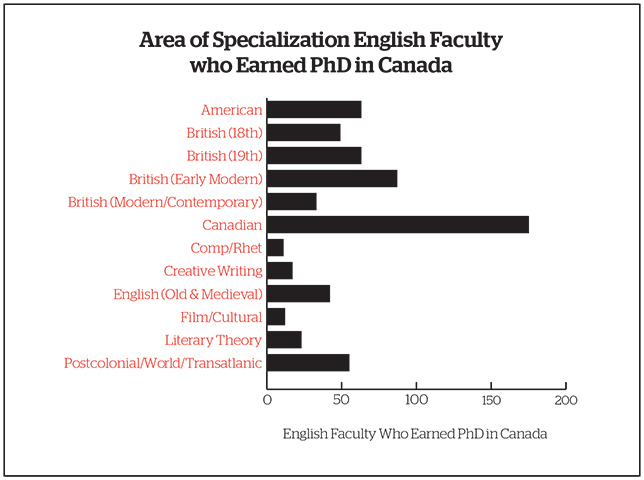
History
In history, 52 percent of faculty earned their PhDs in Canada.
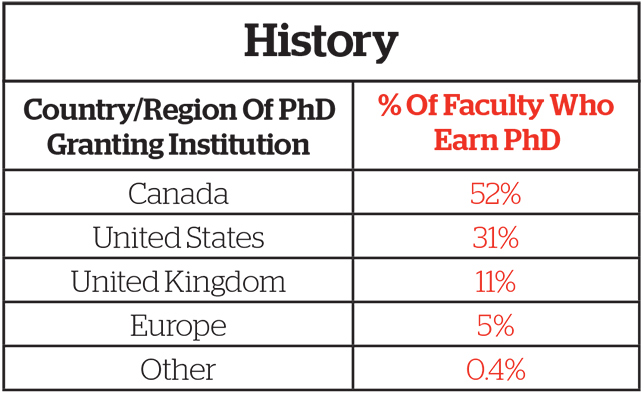
Of those trained in Canada, 56 percent teach Canadian history.
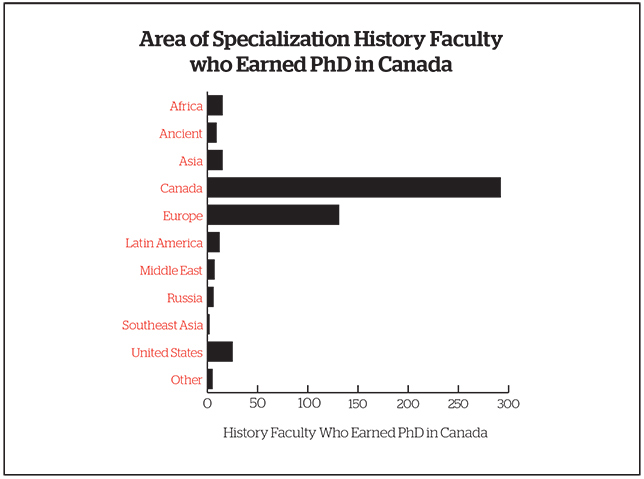
Second, unlike the United States where a handful of elite programs dominate hiring (the Ivies and select flagship state schools), one institution – the University of Toronto – dominates.
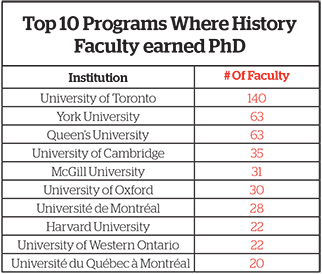 |
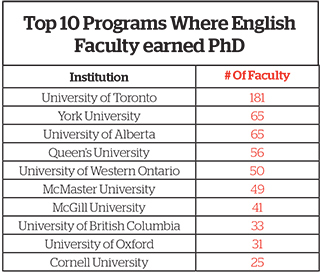 |
Over a quarter of faculty in history and English who earned PhDs in Canada came from the University of Toronto.

Third, the current tight academic job market in Canada is here to stay for the foreseeable future.
In English, 55 percent of faculty earned their PhDs between 1991 and 2005. Only 14 percent of current faculty are at or near the age of retirement, having earned their PhDs in the late 1970s through to the mid 1980s.
In history, it’s equally stark: 58 percent of faculty earned their PhDs in the same 15 year window, with 15 percent at or near the age of retirement. In the chart below, each triangle and square represents a faculty cohort.
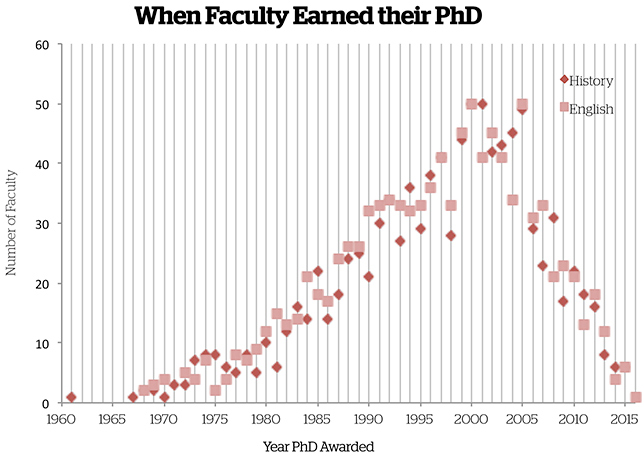
The reason why we have such a large cohort of faculty at the same stage of their career is rooted in the history of the modern university in North America. Universities expanded rapidly in the 1960s to accommodate baby boomers; campuses grew, new universities were built, and new faculty hired across Canada and the United States. But by the early 1970s, the bottom fell out of the academic job market. The rapid expansion of universities had come to a close and universities had essentially staffed-up. Cuts in government spending, high rates of inflation, and the energy crisis, ate into university budgets.
For nearly 20 years, the academic job market was tight as the cohort of faculty hired in the 1960s made their way through the ranks. Starting in the mid-1990s, that cohort retired and was replaced by a new crop of PhDs, creating yet another bubble of faculty clustered around a 10 year time frame.
Critically, what this graph shows is that the adjunctification of higher education is not really at fault for the tight job market – at least, it’s not singularly responsible for it. In fact, if institutions across Canada turned all sessional positions into full-time posts in the next five years, they would simply replicate what has already happened in tenure lines, creating a glut of faculty hired around the same time, of similar age, that would need to retire for new faculty to be hired. This is not to say that sessional instructors should not be afforded fair wages, job security, and benefits. It’s simply to note that ending sessional positions is a short-term solution to the employment crisis for PhDs.
And so, yes, PhDs will necessarily need to find employment beyond the professoriate, and ideally, their programs and institutions will provide career education to support this efforts. Right now, the argument seems tautological: PhDs find employment when they leave graduate school, therefore they do so with the PhD. But in working as a career coach with PhDs, I find that often, PhDs are moving into careers after the PhD. And that is an important distinction.
PhDs are creative, smart, hard working people (and they are often in their mid to late 30s when they make their career transition). Yes, they have an amazing skill set, but they are the types of people who would be successful with or without the PhD.
So the questions for graduate programs are: what knowledge, skills, and abilities are your graduates using in their post-academic careers? What knowledge, skills, and abilities do they lack, but need, to more successfully make a career transition? Some of the best people to ask are your alumni, now working beyond the professoriate. Invite them back to campus not just to give a one-off presentation, but include them at the table to help design innovative programs, redesign curriculum, and to help departments and institutions create lasting connections with non-profit, industry, and government agencies, so that PhD students have clearer pathways to non-faculty careers.
Maren Wood, PhD, is the director of research and co-director of educational programs for Beyond the Professoriate.
Featured Jobs
- Medicine - Associate or Full Professor (Kidney Health)Université de Montréal
- Soil Physics - Assistant ProfessorUniversity of Saskatchewan
- Finance - Faculty PositionUniversity of Alberta
- Sociology - Tenure-Track Position (Crime and Community)Brandon University
- Engineering - Assistant or Associate Professor (Robotics & AI)University of Alberta















Post a comment
University Affairs moderates all comments according to the following guidelines. If approved, comments generally appear within one business day. We may republish particularly insightful remarks in our print edition or elsewhere.
12 Comments
Valu of a PhD within Canada in job market almost useless. Waste of time and energy.
The best of the many articles I have read on this subject.
Have to agree wtih AAH. Also, U of T’s dominance isn’t so surprising, given that PhD programs in other Canadian universities are a relatively new addition, thanks to handsome payouts from provincial governments whose grasp of supply & demand is either shaky or sinister.
But thanks for ‘splaining the job market to those of us who live here.
I’m so glad to see this original research published! Gives departments, faculty members, recent PhDs, and students important information.
I tend to agree with AAH. In the non-academic job market, a Ph.D. seems to be more of a brand or stigma than anything else. Such candidates will be viewed with suspicion by employers as being easily bored, difficult to manage, and regularly refused for all sorts of work as “overqualified” even though that work is more stable and less stressful than what they do in the university sphere and thus represents a step up. I have had friends who are federal public servants tell me that they ignore applications by Ph.D.s out of course because they don’t trust them and their presence makes everyone else feel inferior. If you want a high-flying government job, get a masters’, not a doctorate. Then have your employer fund your doctoral studies when you’re high enough in the ranks that a Ph.D. could add a bit of prestige to an already senior position. But if you’re coming in from the bottom, you’ll just be viewed with mistrust and people will just view you as a threat that has to be kept at bay.
I have worked in non-academic jobs where my supervisors have forbidden me from making my credentials public (in email signatures, for example), and have obviously felt that my presence was an affront to their authority, even though I never manifested any sort of insubordination.
I would say that it would be good if universities explained this honestly to their students, but I think that tenured faculty are so disconnected from the realities of the job market that they genuinely don’t know. This may be one of the (very slight) upsides of the rise of adjunct faculty. At least they have a more realistic grasp of the realities of the modern job market and can offer prospective graduate students a more realistic idea of what to expect and what pitfalls they might avoid.
Overall, I don’t get a clear sense from this article what value Ph.D. holders are to Canadian society or Canadian employers. The author clearly operates from the premise that they have great value, but I guess to meet the people who want to tap into that talent, you have to hire her as a consultant.
Would love to see this analysis for natural sciences, social sciences, and engineering!
The 10,000 PhDs Project at the University of Toronto (U of T) has determined the current employment positions of the PhD graduates who graduated from the U of T from 2000 to 2015 in all departments in the four graduate divisions: Humanities, Social Sciences, Life Sciences and Physical Sciences. The results show that PhD graduates continue to be steadily employed in the academic sector and increasingly find excellent jobs in the private, public and not-for-profit sectors. Similar outcome projects are underway at UBC and other Canadian universities, which are designed to better inform graduate students (and their supervisors) of the diverse range of rewarding careers open to them.
Value of a PhD in English or History? Damn near zero. Oh really – they’ll be successful no matter what? Tell that to my spouse, who has never been able to find a steady job since getting a PhD in the late 1990s (in English, from the U of Toronto) – literally because he has it. We left the country. At least my field is hiring, if not in Canada.
I appreciate the article. I would note that the numbers for employed English PhDs are a bit more complicated–if I go through the PhD alumni from my institution, I see more than double the number of TT or tenured people counted above. That’s because English PhDs are also getting positions in other disciplines: arts, communications, etc. That’s not to say the critique isn’t valid. But it’s also to say that we need to exercise caution when looking at these numbers.
I am a Career Coach. Regardless of whether I agree with some or all of the comments about value of a PHD and I am paraphrasing debating about whether it is a marketable commodity is THE issue. People who wave their parchment around instead of telling employers why they can do the job are not demonstrating that they are employable. My sister used to work at a university and her descriptor was a brilliant person in X field that can barely tie their shoes. A bit of hyperbole to be sure but it makes the point. The acquisition of a certain level of education may be a prerequisite on paper however it is not the reason you will actually be able to do the work. If you cannot demonstrate that with evidence and examples it does not surprise me to know you are under or unemployed.
Two reasons why the University of Toronto dominates in populating tenure–track positions in Canada are: 1, its sheer size and 2, its international reputation as a research powerhouse. U of T is Canada’s largest university with a 2015/16 total enrolment of 86,709 students, including over 17,000 graduate students. (https://www.utoronto.ca/about-u-of-t/quick-facts). U of T (along with McGill and UBC) also consistently ranks among the very best universities in the world and attracts some of the best students in Canada, the US and from around the world. The QS World University Rankings placed U of T 18th in Arts and Humanities, 13th In English Language and Literature, and 14th in History (https://www.topuniversities.com/university-rankings/university-subject-rankings/2017/history). A study of 2009 Ontario PhD graduates by HEQCO (http://www.heqco.ca/en-ca/Research/ResPub/Pages/Ontario’s-PhD-Graduates-from-2009-Where-are-they-now.aspx) found that 30% of PhD graduates are employed as tenure-track professors, another 21% in academia as researchers, lecturers and administrators, with 1/3 employed in positions in the private and public sectors. They too found that U of T outpaced other Ontario universities in PhD graduates working as professors in Canada and in top-tiered international universities. Clearly universities continue to value PhDs as teachers, scholars and generators of new knowledge, but increasingly so does the non-academic world where PhDs are valued as drivers of an innovation economy.
These findings are unsurprising but I appreciate having the data on hand. As someone with an MA in History who would love to get a PhD but is afraid of the horrid job market, I need stats like these to make informed decisions. I only wish I could turn my passion for my subject into a job. Alas I’m doomed to be a declassé intellectual living with painfully poor job prospects and a lower standard of living than my parents, just like other people in their early 20s these days. So much for being the high-achiever in my cohort and having a 3.95 GPA. It’s all a waste of time.